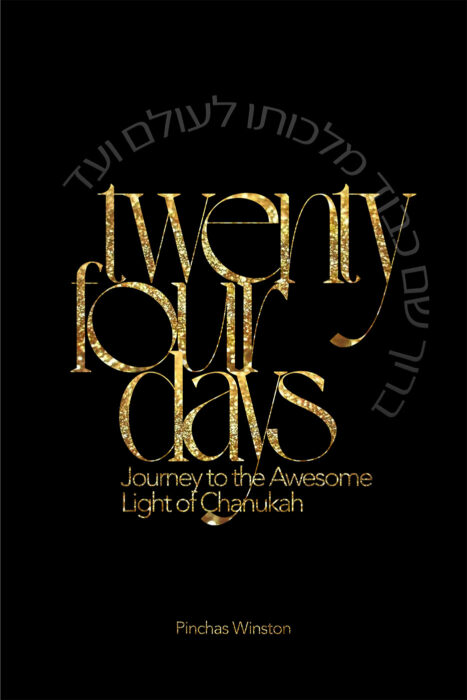Parashas Naso – Shavuos, Issue #1098 – By Rabbi Pinchas Winston\
Friday Night
Do blessings really work today? Not the kind you make over food or a mitzvah, because those are rabbinical enactments for other reasons. But what about Birchas Kohanim mentioned in this week’s parsha, or when a parent blesses their children on Shabbos night? Do they have the effect they once did, or are we just keeping tradition?
What about curses? Balak told Bilaam that he knew that whomever Bilaam cursed was cursed. Is that true today, that someone can curse another person and actually have it come true? There is a story about someone who refused to acknowledge the existence of God, so the person arguing with him told him, “If you truly do not believe in God, then tell Him to kill your mother!”
The sworn atheist couldn’t get himself to do it (he liked his mother) just in case (what if she “coincidentally” died for another reason), which downgraded him to being only an agnostic. But would it have made a difference anyhow had he been brazen enough to utter such a curse? Do words have that kind of power today? If they did, a lot of people would probably be either sick or dead now, given today’s political climate and all the cursing going on…
The answer is yes and, no. It’s not just a matter of uttering a blessing or saying a curse, though sometimes they can come to fruition more a matter of Hashgochah Pratis than the power of the blessing or curse. If we learn anything from the story of Bilaam, it is that a person can only bless or curse someone God wants to bless or curse, and He will arrange for that to happen through the appropriate blesser or curser.
It has to do with how blessings and curses work. Blessings are the result of an influx of Divine light and curses are the withdrawal of that light. Everything in Creation exists as a function of God’s light, the extent to which is determined by how much Divine light flows to the thing or person. A blessing therefore increases the light, and the positive impact is the result. That’s why it is called a “brochah,” from the word “breichah,” which is a spring of water or, in this case, a “stream” of light.
But unlike everyday light, which is physical, Divine light is exceptionally holy. The amount that we automatically receive to stay alive and function is a gift, and one that needs to be respected. A major part of a sin is the abuse of this light by doing something of which God does not approve. Every sin is a profanation of Divine light.
But if you want extra light, because you need a better parnassah, or you have shalom bayis issues, or you want children, or to marry off a child, etc., then you had better consider your spiritual appropriateness. In general, holy things only go to holy people. This is why Bilaam was blind in one eye, Chazal say. At least there was a space in him that wasn’t impure like the rest of his body. It was through that “space” that God spoke with him for the sake of the Jewish people.
Shabbos Day
ON THE OTHER hand, the Gemora says that one should not take the blessing or curse of a “simple” person lightly (Megillah 15a). It brings examples of such blessings and curses coming to fruition. Avimelech told Sarah, “I have given a thousand pieces of silver to your brother; behold it is to you a covering of the eyes for all who are with you, and with all you shall contend” (Bereishis 19:16). The Gemora says that this had to do with Yitzchak later becoming blind (even though Avimelech seemed to mean it in a good way!).
But that could have more to do with what we said before, that the curse or blessing was destined to happen anyhow, and for some reason God wanted it to be announced by someone down here. As the Gemora says, merit comes through the merit worthy, and bad comes through the culpable (Bava Basra 119b). It is true with respect to blessings and curses as well.
Isn’t this true of all blessings and curses? As Bilaam told an angry and frustrated Balak, “If Balak gives me his house full of silver and gold, I cannot transgress the word of God to do either good or evil on my own. Only what God speaks can I speak” (Bamidbar 24:13).
This is what Chanina ben Dosa told the witch who tried to curse him:
“If you succeed, go and do it. I am not concerned about it, as it is written: ‘There is none else besides Him’ (Devarim 4:35).” He meant, “You, witch, have no power to do good or bad to me. If your curse seems to take effect, it is only because God has decided to impact me in this way. I am only concerned about the judgment that might have led to this, not about you.”
So what then does this mean?
And I will make you into a great nation, and I will bless you, and I will aggrandize your name, and [you shall] be a blessing. (Bereishis 12:2)
The blessings are entrusted into your hand. Until now, they were in My hand; I blessed Adam and Noach. From now on, you may bless whomever you wish. (Rashi)
This would seem to imply that Avraham had the power to bless whomever he saw fit. It doesn’t sound as if he was being given the ability to bless only those people whom God wanted blessed. And it sounds as if this was not only unique to him, but all of his descendants as well…throughout all of history.
While we’re at it, let us discuss not just blessings, but miracles themselves. Miracles were rare and such a big deal in Tanach. Avraham being saved from the fire in Ur Kasdim. Ya’akov being saved from Eisav and Lavan. But in the Gemora, such miracles happened all the time, and in some of the seemingly most trivial of circumstances. Did something change historically, and if yes, what?
Seudas Shlishis
THE PHYSICAL WORLD is the way it is because of the spiritual world. Even though they are both very different worlds, as the world of a son compared to that of his father (hence, the generation gap). Since the former came from the latter however, they can’t help but be similar, both the son and the father and the physical world and the spiritual one.
Take electricity, for example. It is very physical and therefore its effects are quite visible. When the light goes on, you know that it is because you flicked the switch, allowing electricity to flow through the wires to the bulb. Thus, just as only certain materials are good conductors for electricity, only certain types of people are good “conductors” for Divine light. Just as electricity can be dangerous if improperly used, likewise Divine light kills when improperly used, such as in the case of Nadav and Avihu.
The miracle workers in the Gemora, the Tannaim, were good conductors of Divine light. They achieved this by aligning their perspectives with God’s, so they looked at the world and history as He did, so God looked at both as they did. They may have done miracles at will, but it was a will they shared with God. Even when they initiated the brochah or miracle, God agreed to it so he fulfilled it as they willed it. As they say, “Righteous people decree and God fulfills.”
When then must we be careful with the blessing or curse of a simple person? Firstly, we can’t always tell who is righteous in God’s eyes. A person may look “simple” to us, but from God’s perspective they may be spiritually powerful people. We don’t know what they have had to overcome to be who they are, and that might have made them relatively righteous as far as God is concerned.
Secondly, we may only see a simple person giving the blessing or hurling a curse, but everything is a function of Hashgochah Pratis—Divine Providence. God has many messengers and means to deliver His message or warning to a person. You can discount the messenger but the message might be crucial information from God about your direction in life.
As the mishnah says, a wise person is one who learns from every person (Pirkei Avos 4:1). It doesn’t qualify what kind of people are excluded from this. Rebi Meir even went so far as to continue to learn Torah from Elisha ben Abuya, even after he became Acher, the quintessential heretic (Chagigah 15b).
The Gemora questioned the wisdom of Rebi Meir’s choice of teacher, but concluded that he had the ability to keep the good and reject the bad. The rest of us don’t, so we should only learn from reputable teachers who have the proper Torah credentials. But it has been said that God talks to the Jewish people through their enemies, so even though they do not make good teachers, their messages often unwittingly contain information God wants us to know.
Shavuos
THREE THINGS ARE necessary for a person to have free will. They have to believe in God, they have to believe that God communicated His truth to man, and they have to at least be aware of their yetzer hara and its efforts to spiritually undermine them. All of this happened for the Jewish people when God gave them Torah.
Until Mt. Sinai, the Jewish people had not personally heard God speak. Until that time, God had communicated with them through Moshe Rabbeinu, which always left some room for doubt about God or the message. But once God addressed the nation Himself at Har Sinai, everyone had a first-hand experience with the reality of God unparalleled throughout history.
Though we had started receiving mitzvos at Marah, and really back in Egypt, it wasn’t until Har Sinai that we received the entire Torah in the most awesome way possible. Absolute truth had been shared with mankind, and there was no question about its veracity.
As for the yetzer hara, we got a clear picture of how quickly it can be aroused through the episode of the golden calf. We always knew we had it, but we lost it temporarily after saying Na’aseh v’Nishma. This is why most Jews did not participate in the sin of the calf, only the stragglers who were more like the Erev Rav than the rest of the Jewish nation.
When we returned to being mortal once again and regained our yetzer hara, the war began against it because we now had mitzvos to keep, and the yetzer hara was not keen about that at all. As God said, “I created the yetzer hara, and I created Torah as its spice” (Kiddushin 30b).
Therefore, the greatest gift we received at Kabbalas HaTorah was the gift of bechirah, free will. Without it, we are not much better than the animals around us, and we certainly can’t earn a portion in the World to Come. We can’t live up to being made in the image of God, which is the basis of true and lasting happiness.
So even though Moshe Rabbeinu broke the first set of tablets, he did not break our gift of free will. On the contrary, if anything, it increased after regaining the yetzer hara. Bechirah is what we have over the animals, and even over the angels, who can only do what they’re told by God.
It’s something to think about and appreciate, perhaps when deciding if you really need that second piece of cheesecake.
Chag Samayach and great Kabbalas HaTorah.
Rabbi Pinchas Winston
Thirtysix.org



















